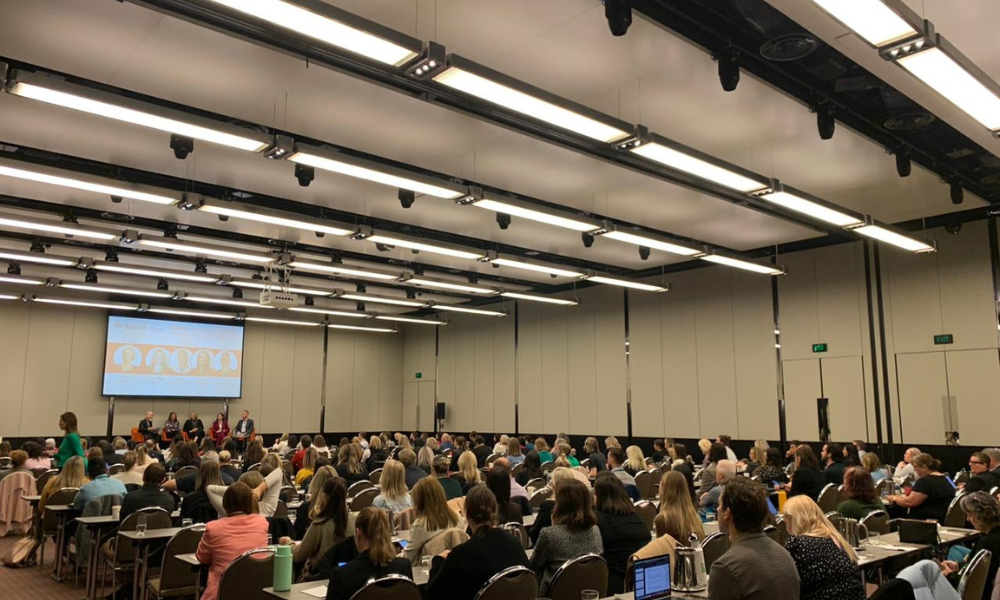Delegates gather in Sydney to hear valuable insights at HRD’s National HR Summit Australia

Ian Thorpe is one of Australia’s greatest Olympians, having captivated the nation – and the world – during his swimming career.
He won 11 world championship titles, claimed 10 Commonwealth Games medals, broke 22 world records and was the first person in his history to win six gold medals in one world championship. Thorpe also won nine Olympic medals.
This week, Thorpe was the keynote speaker at HRD’s National HR Summit Australia, where he described how, at age 17, he was able to accomplish his lifetime dream of becoming an Olympic champion.
“The expectation wasn't that I'd performed well, the expectation was that I would win,” he said.
“And I was reminded of this throughout my entire preparation for the Olympics. Keeping in mind, I am a 17-year-old; there is the weight of the nation and expectations on me.”
Thorpe went on to discuss his experiences at various swimming events as well as the lessons he learned throughout his career which can also translate in the workplace. He described how, when you experience a high from, say, competing at a high-level swimming event and being cheered on by fans – there is also a low that can come with that.
“When you're in that pendulum swing, you actually operate on two really bad extremes,” he said. “So what you want to be able to do is be in the centre of that; to be able to understand your emotions, the way that you’re feeling, realising that it is something that probably is only temporary.
“And know your skills to be able to achieve your best even under circumstances that are difficult, that you may not have experienced. Being able to concentrate on the skills that you do have and being willing to have the support of other people around you.”
Thorpe also shared how important it is for your wellbeing to focus not only on one area of your life. When asked by a delegate how he adjusts to life after having accomplished so much, Thorpe referenced his position as Chair of the Australian Institute of Sport’s (AIS) Wellbeing Advisory Committee, which focussed on athlete health, wellness and education. The organisation focuses on the health and wellbeing outcomes of athletes, not only on sporting performance.
“The strategy around this was being able to have an athlete that performs pre-elite level, during elite level and post-elite level, where that transition is considered,” Thorpe said.
“A lot of people that are solely focused on one area of their lives, will always struggle in the transition to something else. And it's why we have an emphasis around having other interests than what you do.”
Strategic recruitment
The HR Summit was held at the Winx Stand, Royal Randwick in Sydney, with delegates able to attend the main conference, Director’s Forum and a series of workshops. The workshop topics ranged from how to overcome Australia’s labour and skills shortages to the key to developing exceptional leaders. In addition, there were a variety of exhibitor stands operated by companies including Martian Logic, Origin, Humanforce and Employment Hero.
During the conference session on “Strategic recruitment – how to attract and hire top employees,” Rebecca Roberts, chief people and culture officer at St. Vincent’s Health, emphasised the importance of strategic recruitment and how HR teams should question whether their recruitment is “truly strategic”.
She added that HR teams also need to have honest conversations about what good recruitment practices could look like.
“There is no way that you can build your future state will unless you are willing to have some tough conversations,” Roberts said. “Being willing to ask those tough questions and being willing to co-create not just in HR, but with your frontline business, what a new world could look like is absolutely the starting point for strategic recruitment.”
Fellow panellist Lisa Schilling, head of programs, workforce at Bupa and former project director, international recruitment program at Department of Health, Victoria, discussed how HR teams need to understand and invest in their existing workforce.
“If there are cultural issues definitely address those,” she said. “Engage your current workforce. There’s no point entrusting hundreds of other people into a role where you’ve got a hole in your bucket, no one wants to stay [and] people are leaving. Grow your own as well, start to have career conversations, start to develop your existing staff.”
Focus on industrial relations
Julian Arndt, director, Australian Business Lawyers & Advisors held a session on what the Industrial Relations Revolution means for HR teams. He listed the string of industrial relations reforms and legislations that have rolled out over the last two years from the penalties on wage theft through to the positive duty on sexual harassment.
“You don't need a complaint for this to be a problem,” Arndt said when discussing the positive duty on sexual harassment. “If the regulator asks the questions, knocks on the door and says ‘Your board, your leadership team, do they know about this? Have they had any training?’ and you say no – [it’s a] problem.
“Have you got a clear, streamline regime and subject specific regime for handling disclosures? If you haven't got a policy, if you haven't got a procedure, you need to think about it.”
Engaging remote staff
During the director’s forum session on “Learning and development to engage remote workers,” the panellists shared strategies for employees to capture learning opportunities both in and out of the office.
Sarah Herring, regional head of learning and development, Asia Pacific at Moët Hennessy described how the company does experiential learning.
“Experiential learning is on the job learning,” she explained. “It's doing your job and getting constructive, positive feedback. It's about understanding what your strengths are, leveraging your strengths and then applying them in a different way.”
One of the examples she shared was that Moët Hennessy has the opportunity to do immersions with their employees.
“We're very lucky, we get to do a full immersion with our Maison, for example,” she said. “Our team members get to go and work with the wine maker where you will go through and see the whole lifecycle of the product. It's all hands on, it's all applied learning.”
Implementing wellbeing strategies
In the panel on “Effective wellbeing strategies to build resilient teams,” Olivia Boyle, clinical psychologist and senior manager clinical governance at TELUS Health, mentioned a report by PwC and BeyondBlue which found that for every dollar that an organisation prioritises action towards employee mental health, they get $2.30 back as their return on investment.
“Creating healthy workplaces creates productive workplaces,” Boyle said. “And I think that information really drives that ability to have those conversations from an HR perspective with decision makers.”
She went on to describe how to create an authentically psychologically safe workplace, which included providing tailored support through EAP providers as well as having workplace trust.
“Employees who trust their organisation feel like they can communicate if they're not coping or if they need support,” she said. “Or they can communicate if they are looking for something in terms of progression or opportunities.”
On the other hand, fellow panellist Andrea Vienet, people experience partner at Carman’s Kitchen, described how to avoid “wellbeing washing” – the idea of discussing wellbeing but not actually investing in it.
“Leaders need to be invested in it, they need to be participating in things themselves,” she said. “I think the next really key thing is feedback. So you really need to listen to what your people are saying terms of what wellbeing means to them and what they need.”








